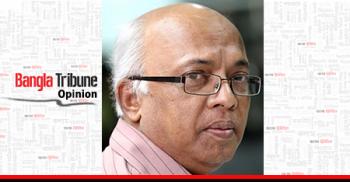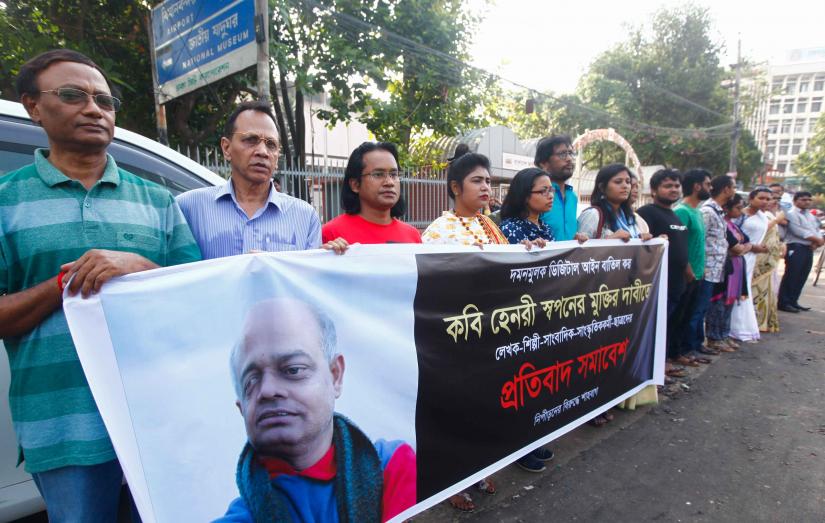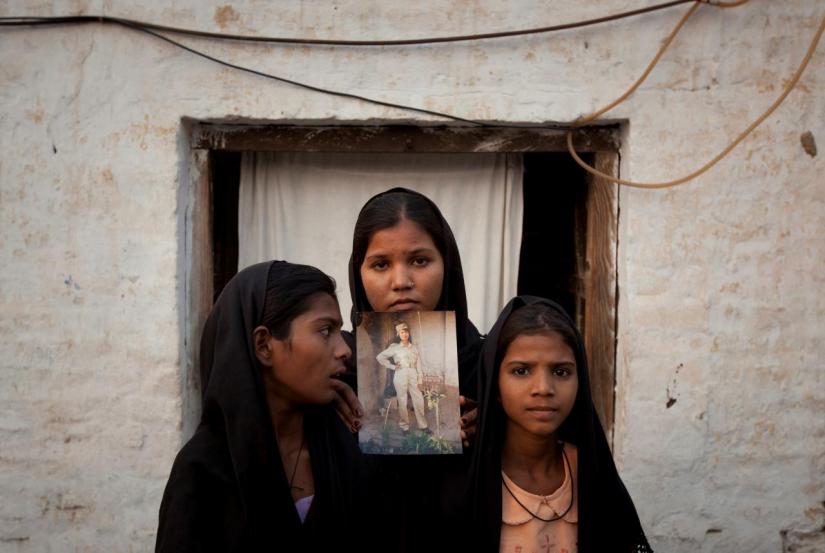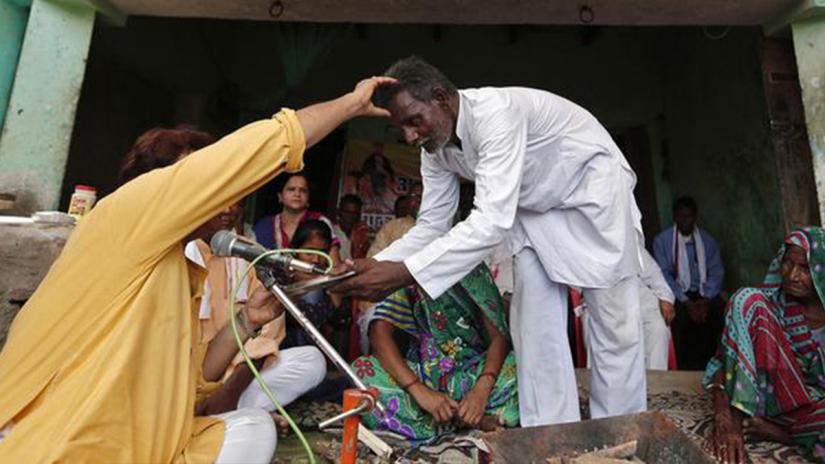 Much talk has gone on around the issue of religious sentiments, of Dhormio Onubhuti as it is known in Bangla; of such sentiments being hurt by people who in the opinion of many ought to have known better. The recent arrest and freeing on bail of a poet in Barishal is but one more instance of the thin, tenuous line we often tread between what is religious sentiment and what is not. Matters of faith, in this day and age, remain the fundamentals upon which large sections of people around the globe determine their attitude to the world, indeed toward men and women who are not inclined to share their views of God and of Creation. The attitude all too often undermines the essentials on which basic humanity functions, to our profound regret and shame.
Much talk has gone on around the issue of religious sentiments, of Dhormio Onubhuti as it is known in Bangla; of such sentiments being hurt by people who in the opinion of many ought to have known better. The recent arrest and freeing on bail of a poet in Barishal is but one more instance of the thin, tenuous line we often tread between what is religious sentiment and what is not. Matters of faith, in this day and age, remain the fundamentals upon which large sections of people around the globe determine their attitude to the world, indeed toward men and women who are not inclined to share their views of God and of Creation. The attitude all too often undermines the essentials on which basic humanity functions, to our profound regret and shame.
What then is conveyed by the term ‘hurting religious sentiments’? Where do people feel that their innermost feelings about the faith they practise are wounded by the insensitivities of individuals and groups who do not have it in them to respect religions not their own or with which they do not identify? Religious sentiments are indeed hurt when cartoonists in the West, in the name of freedom of expression, draw caricatures of the Prophet of Islam, with consequences that are only predictable and leave us all disturbed.
 Such sentiments are left wounded beyond measure when obscurantist Muslim clerics in Bangladesh go around misguiding people with their fanaticism, which is essentially their insistence that this country has no place for Hindus and Christians and Buddhists, that because the land is home to a vast majority of people professing the Islamic faith it is a Muslim country.
Such sentiments are left wounded beyond measure when obscurantist Muslim clerics in Bangladesh go around misguiding people with their fanaticism, which is essentially their insistence that this country has no place for Hindus and Christians and Buddhists, that because the land is home to a vast majority of people professing the Islamic faith it is a Muslim country.
Religious sentiments come under grievous assault when an innocent Christian woman in Pakistan observes her fanatical Muslim neighbours baying for her blood on the spurious charge of blasphemy. Her religious sentiments are hurt by those who, forgetting the piety ingrained in their faith, prowl the streets looking for a chance to shed her blood, insulting Jesus Christ in the process.
When Buddhist mobs, throwing the teachings of the Buddha to the winds, fan out to nab Muslims in Myanmar’s Rakhine State and kill them, for they are ‘interlopers’ and ‘foreigners’, they hurt the religious sentiments of these Muslims the world knows as Rohingyas. Religious sentiments come under attack when a band of murderous Muslims blows hundreds of Christians to pieces on Easter Sunday; when merchants of religious hate behead Christians and Yazidis in scorching deserts in their perversion of a caliphate.
When a rabid Christian threatens to set the Quran alight, in America, in public, he hurts the sentiments of devout Muslims all across the globe. In similar manner, when the Bhutto government decrees in Pakistan a ban on Ahmadiyyas from calling themselves Muslims, it whips the religious sentiments of a community into frightened silence; when bigoted Muslims in Bangladesh call for a similar ban on Ahmadiyyas in the country, they stir up hatred and grievously assault the community, badly hurting its religious sentiments.
 Religious sentiments take a terrible blow when cow vigilantes in India pounce on innocent Muslims and kill them or ask them to go to Pakistan. Questions are raised when men like Yogi Adityanath and (the now deceased) Bal Thackeray make their incendiary feelings about Muslims known and the union government of their Hindutva friends looks the other way. Religious sentiments are reduced to a pulp when Christians are attacked and Muslims are compelled to be part of Ghar Waapsi terrorism in India.
Religious sentiments take a terrible blow when cow vigilantes in India pounce on innocent Muslims and kill them or ask them to go to Pakistan. Questions are raised when men like Yogi Adityanath and (the now deceased) Bal Thackeray make their incendiary feelings about Muslims known and the union government of their Hindutva friends looks the other way. Religious sentiments are reduced to a pulp when Christians are attacked and Muslims are compelled to be part of Ghar Waapsi terrorism in India.
Dhormio Onubhuti, the assaults on it, leaves basic humanity in tatters. These assaults come in the shape of Hindu temples and idols being vandalised by rabid Muslim mobs in Bangladesh in the Puja season. Religious sentiments are given short shrift when the state media stay away from broadcasting messages from the religious scriptures of Hindus, Buddhists and Christians in Bangladesh, a state that is constitutionally secular. When lies are invented and Buddhist temples in Ramu are put to the torch, it is the religious sentiments of Bangladesh’s Buddhists that are trampled on.
 Religious sentiments are left frayed when anti-Semitic elements question the figures for the Jews put to death by the Nazis in the Second World War. They are hurt when Judaism is confused, often deliberately, with Zionism and when every Jew is looked upon as a Shylock.
Religious sentiments are left frayed when anti-Semitic elements question the figures for the Jews put to death by the Nazis in the Second World War. They are hurt when Judaism is confused, often deliberately, with Zionism and when every Jew is looked upon as a Shylock.
When states decree a ban or a set of restrictive measures on a religious community, as the Chinese authorities have been doing in relation to their Uighur Muslims, it is religious sentiments being officially subjected to repression.
Religious sentiments are left wounded when it is vilification and bigotry hurled at individual and collective belief. When fanatics seek to establish the primacy of their faith over those of others, it is a calculated assault on the religious sentiments of people. When people turn from prayer and to frenzied war in defence of their gods, it is pain which touches God and sears the beauty of Creation.
Kahlil Gibran put it well: “I love you when you bow in your mosque, kneel in your temple, pray in your church. For you and I are sons of one religion, and it is the spirit.”
Syed Badrul Ahsan is a journalist and author of biographies of Bangabandhu Sheikh Mujibur Rahman and Tajuddin Ahmad


